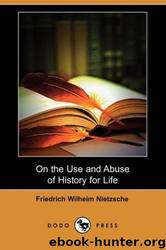On the Use and Abuse of History for Life by Friedrich Nietzsche

Author:Friedrich Nietzsche
Language: eng
Format: mobi
Published: 0101-01-01T00:00:00+00:00
VII
When the historical sense reigns unchecked and drags with it all its consequences, it uproots the future, because it destroys illusions and takes from existing things the atmosphere in which they alone can live. Historical justice, even if it is practiced truly and with a purity of conviction, is therefore a fearful virtue, because it always undermines living and brings about its downfall. Its judgment is always an annihilation. If behind the historical drive no constructive urge is at work, if things are not destroyed and cleared away so that a future, something already alive in hope, builds its dwelling on the liberated ground, if justice alone rules, then the creative instinct is enfeebled and disheartened.
For example, a religion which is to be turned into historical knowledge under the power of pure justice, a religion which is to be scientifically understood through and through, is by the end of this process immediately destroyed. The reason for this is that in the historical method of reckoning so many false, crude, inhuman, absurd, and violent things always emerge that the fully pious atmosphere of illusion in which alone everything that wants to live can live necessarily disappears. But only in love, only in a love overshadowed by illusion, does a person create, that is, only in unconditional belief in perfection and righteousness. Anything which compels a person no longer to love unconditionally cuts away the roots of his power. He must wither up, that is, become dishonest.
In effects like this, history is opposed by art. And only when history takes it upon itself to turn itself into an art work and thus to become a purely artistic picture can it perhaps maintain the instincts or even arouse them. Such historical writing, however, would thoroughly go against the analytical and inartistic trends of our time; indeed, they would consider it counterfeit. But history which only destroys, without an inner drive to build guiding it, makes its implements permanently blasé and unnatural. For such people destroy illusions, and "whoever destroys illusions in himself and others is punished by the strongest tyrant, nature." True, for a fairly long time one can keep oneself really busy with history completely harmlessly and thoughtlessly, as if it were an occupation as good as any other. The newer Theology, in particular, seems to have become involved with history purely harmlessly, and now it will hardly notice that, in doing so, it stands, probably very much against its will, in the service of Voltaire's écrasez [ i.e., Voltaire's extreme hostility to the church].
Let no one assume from this a new powerfully constructive instinct.
For that we would have to let the so-called Protestant Union be considered the maternal womb of a new religion and someone like Judge Holtzendorf (the editor of and chief spokesman for the even more questionable Protestant Bible) as John at the River Jordan. For some time perhaps the Hegelian philosophy still clouding the brains of older people will help to promote that harmlessness, somewhat in the way
Download
This site does not store any files on its server. We only index and link to content provided by other sites. Please contact the content providers to delete copyright contents if any and email us, we'll remove relevant links or contents immediately.
| Deconstruction | Existentialism |
| Humanism | Phenomenology |
| Pragmatism | Rationalism |
| Structuralism | Transcendentalism |
| Utilitarianism |
The remains of the day by Kazuo Ishiguro(7549)
Tools of Titans by Timothy Ferriss(6944)
The Black Swan by Nassim Nicholas Taleb(6190)
Inner Engineering: A Yogi's Guide to Joy by Sadhguru(5893)
Giovanni's Room by James Baldwin(5876)
The Way of Zen by Alan W. Watts(5794)
The Six Wives Of Henry VIII (WOMEN IN HISTORY) by Fraser Antonia(4788)
The Power of Now: A Guide to Spiritual Enlightenment by Eckhart Tolle(4751)
Astrophysics for People in a Hurry by Neil DeGrasse Tyson(4617)
Asking the Right Questions: A Guide to Critical Thinking by M. Neil Browne & Stuart M. Keeley(4572)
12 Rules for Life by Jordan B. Peterson(3730)
The Ethical Slut by Janet W. Hardy(3500)
Skin in the Game by Nassim Nicholas Taleb(3459)
Housekeeping by Marilynne Robinson(3401)
The Art of Happiness by The Dalai Lama(3382)
Double Down (Diary of a Wimpy Kid Book 11) by Jeff Kinney(3272)
Skin in the Game: Hidden Asymmetries in Daily Life by Nassim Nicholas Taleb(3263)
Walking by Henry David Thoreau(3233)
12 Rules for Life: An Antidote to Chaos by Jordan B. Peterson(3199)
